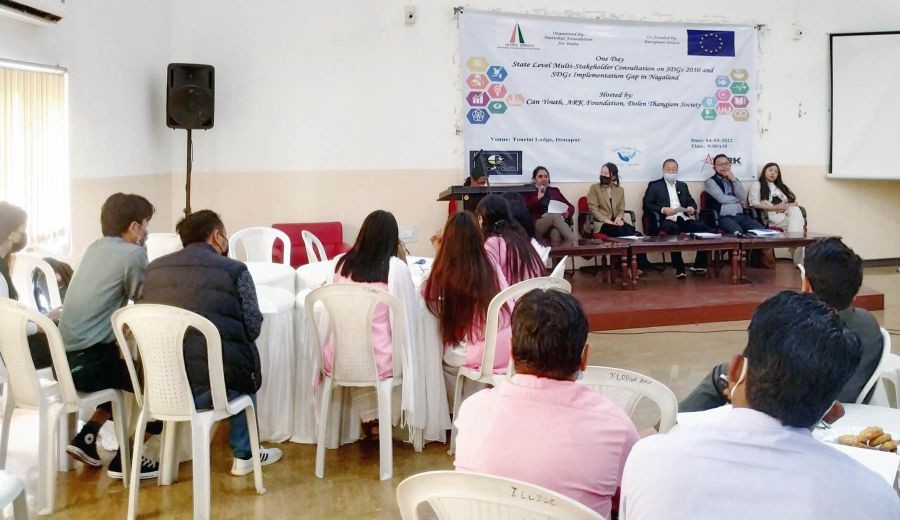A section of students and others attending the State Level Multi-Stakeholder Consultation on SDGs 2030 and SDGs Implementation gap in Nagaland held at the Tourist Lodge, Dimapur on March 4. (Morung Photo)

On SDGs implementation gap in Nagaland
Morung Express News
Dimapur | March 4
A comprehensive one day “State Level Multi-Stakeholder Consultation on SDGs 2030 and SDGs Implementation gap in Nagaland,” was held at the Tourist Lodge, Dimapur on March 4.
The event was hosted by members of Can Youth, ARK Foundation and Dolen Thanjam Society while the National Foundation of India (NFI), an NGO based in New Delhi, was the main organizer.
With an aim towards promoting civil society groups and youth engagement through a model of active participation and inclusive development at the grassroots using SDGs, the event saw a bevy of student leaders, CSOs, government officials, teachers and students participated.
Building resilient sustainable solution
Talking to The Morung Express on the sideline, Jenpu Rongmei, Founder and Chairman, Can Youth, remarked how the workshop was a way to enhance the community and people involved in the field of implementing the SDGs. Highlighting on the role of community leaders to bring forth issues in a better manner, he said that responsibility lies not solely on the government but on the people as a whole.
Commenting on the overall workshop, Imsutoshi, Programme Officer of NFI said, “We have to come forward and build a resilient sustainable solution to all the issues that we have for prosperity, development and for people to have a better life.” Imsutoshi added that he would like to see “peace, sustenance and young people coming forward to do their own thing making a living for themselves.”
Need to highlight implementation of SDGs
Among the participants present were students who expressed their opinion on the condition of the education system in the state. A student from NEISSR Dimapur commented that the implementation of SDGs should be highlighted in all schools and colleges by the government, “as they say that we are the change makers of tomorrow.” She observed that Nagaland education system is mainly based on “theoretical knowledge with a lack of practical knowledge; vocational training should be given more importance.”
“If the government brings a more outdoor based knowledge which can broaden our mindsets, we would be able to compete with people outside the state and reduce unemployment as well,” another student expressed.
Earlier, Executive Director of NFI, Biraj Patnaik gave the introductory address while Yanthungbemo Kikon, SDO (Civil) Dimapur delivered the keynote in the first session.
It centered on presentation by a host of panelists including Nayantara Sasikumar, IES OSD (Planning) and Nodal Officer (SDGs), Dr Moalemba Jamir, Associate Editor, The Morung Express, Limabenla Jamir, International Development Consultant, Neiteo Koza, Advocate and State Coordinator, Human Rights Law Network and by Fr GL Khing, General Secretary, Nagaland Christian Joint Forum.
The panelists dwelt on issues regarding peace and development in the context of Nagaland and how to tackle challenges such as poverty, rural to urban migration, illegal taxation, gender inequality, imparting quality education and corruption. The issue around AFSPA was also brought forth during the discussion by a member panelist who expressed that as long as the Act exists, no such kind of peace or development will take place in the state.
The second session witnessed a round-table discussion with the participants and invitees.



